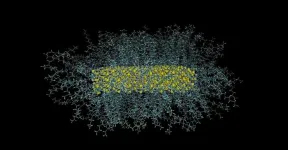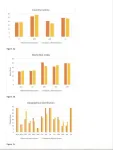(Press-News.org) A protein that is involved in determining which enzymes cut or unwind DNA during the replication process has been identified in a new study.
In a new paper published in Nature Communications, an international team of researchers have found that the protein USP50 supports the DNA replication process by helping to decide the proper use of nucleases or helicases. These enzymes are implemented during the DNA replication process to promote ongoing replication and where the copying machinery runs into problems and needs to restart.
The team led by Professor Jo Morris from the University of Birmingham’s Department of Cancer and Genomic Sciences have identified that USP50 determines which or the many helicases and nucleases are used during ongoing replication, fork restart, and the maintenance of telemores, the DNA-rich protein structures on the ends of chromosomes. The identification of USP50’s role provides a new insight into the DNA replication process and could lead to a greater understanding of how some hereditary conditions develop.
Jo Morris, Professor of Molecular Genetics in the Department of Cancer and Genomic Sciences at the University of Birmingham and corresponding author of the study said:
“Our study concerns how our cells use specific enzymes to support the typical regulation of DNA replication. We found that because there are several different enzymes involved in cleaving and unwinding, cells must regulate which ones they use so that replication can happen properly. We identified that protein USP50 is involved in this regulation.
“This discovery may be an important step to understanding how some hereditary gene changes lead to early onset ageing and cancer.”
Attempted workaround
The study also found that when USP50 is absent during replication activity, cells attempted to use various nucleases and helicases in a less coordinated fashion leading to replication defects in cells.
Professor Morris added: “The finding that cellular nucleases and helicases can stop replication of certain sections of DNA was a surprise – it shows that cells closely co-ordinate their toolkit of DNA-processing enzymes to get DNA replication properly done.”
Professor Simon Reed, Co-Director of the Division of Cancer and Genetics at Cardiff University and a co-founder of Broken String Biosciences, and co-author of the paper said:
"I am truly honoured to have co-authored this paper published in Nature Communications, exploring the critical role of USP50 in safeguarding genome stability. This research sheds light on the complex mechanisms that protect our cells from DNA damage and highlights how these discoveries could shape future therapies. Thank you to my collaborators—together, we've taken another step forward in understanding how our cells function and how we can apply this knowledge to advance medical science."
END
Protein involved in balancing DNA replication and restarting found
USP50 protein helps balance nuclease and helicase activity during critical processes
2024-10-14
ELSE PRESS RELEASES FROM THIS DATE:
How liberals and conservatives can have better conversations, according to a psychologist
2024-10-14
Bridging Our Political Divide collects the insights of a psychologist who offers antidotes to the unproductive arguments that now dominate our political culture and ways to find common ground.
New York, U.S./Oxford, UK, October 14, 2024 – As the 2024 US Presidential Election in November inches closer, the partisan divide in American society has never felt more apparent – or pervasive.
From workplace chatter to heated discussions at family gatherings, many Americans may have asked themselves, ‘How can I make this ...
Survey finds 25% of adults suspect they have undiagnosed ADHD
2024-10-14
COLUMBUS, Ohio – Attention deficit/hyperactivity disorder – also known as ADHD – is typically thought of as a childhood condition. But more adults are realizing that their struggles with attention, focus and restlessness could in fact be undiagnosed ADHD, thanks in large part to trending social media videos racking up millions of views.
A new national survey of 1,000 American adults commissioned by The Ohio State University Wexner Medical Center and College of Medicine finds that 25% of adults now suspect they may have undiagnosed ADHD. But what worries mental health experts is that only 13% of survey respondents have shared their suspicions with their doctor.
That’s ...
Let there be light: Bright future for solar panels, TV screens and more
2024-10-14
From brighter TV screens to better medical diagnostics and more efficient solar panels, new Curtin-led research has discovered how to make more molecules stick to the surface of tiny nanocrystals, in a breakthrough that could lead to improvements in everyday technology.
Lead author Associate Professor Guohua Jia from Curtin’s School of Molecular and Life Sciences, said the study investigated how the shape of zinc sulfide nanocrystals affected how well molecules, known as ligands, stick to their surface.
“Ligands, play an important role in controlling the behaviour and performance ...
Innovative nanoparticle therapy targets fat absorption to combat obesity
2024-10-13
(Monday 14 October 2024, Vienna, Austria) Researchers have unveiled a novel approach to tackle obesity by targeting fat absorption in the small intestine. The cutting-edge nanoparticle system, engineered to deliver therapeutic molecules directly to the digestive tract, has shown significant potential to prevent diet-induced obesity.1,2
Presented today at UEG Week 2024, the study focuses on an enzyme called Sterol O-acyltransferase 2 (SOAT2), which plays a critical role in fat absorpsion in the small intestine.3,4 By inhibiting this enzyme in the small intestine, the study offers a promising therapeutic approach to reduce fat absorption ...
Novel procedure combined with semaglutide may eliminate insulin dependency in type 2 diabetes
2024-10-13
(Monday 14 October 2024, Vienna, Austria) Groundbreaking research presented today at UEG Week 2024 reveals a promising new treatment strategy for type 2 diabetes (T2D) that could significantly reduce or even eliminate the need for insulin therapy.1
This innovative approach, which combines a novel procedure known as ReCET (Re-Cellularization via Electroporation Therapy) with semaglutide, resulted in the elimination of insulin therapy for 86% of patients.
Globally, T2D affects 422 million people, with obesity recognised as a significant ...
Three key signs of major trauma could speed up treatment of severely injured children brought to emergency departments by carers not ambulances
2024-10-13
Copenhagen, Denmark: Severely injured children who are brought to an emergency medical department by their parents or carers are often not seen as quickly as those who arrive at hospital via ambulance, according to findings presented at the European Emergency Medicine Congress today (Monday). [1]
The study’s researchers identified three key trauma features that should prompt doctors to review these patients immediately and potentially prioritise their treatment: boggy swelling to the head, abdominal bruising, and thigh swelling or deformity.
The study was carried out in an inner-city ...
Climate change is a health emergency too
2024-10-13
Copenhagen, Denmark: International experts in emergency medicine have warned that climate change is likely to have a severe impact on emergency services around the world. Despite this, few countries have assessed the scale of the impact or have a plan to deal with it.
In a special session at the European Emergency Medicine Congress today (Sunday), Luis Garcia Castrillo, a professor in emergency medicine, now retired, at the Hospital Marqués de Valdecilla, Santander, Spain, described how he and colleagues from EUSEM’s Emergency Medicine Day working group had asked 42 focus groups, consisting of experts in emergency medicine, prehospital care ...
Chronic stress accelerates colorectal cancer progression by disrupting the balance of gut microbiota, new study shows
2024-10-12
(13 October 2024, Vienna, Austria) Cutting-edge research has uncovered how chronic stress disrupts the balance of gut microbiota to speed up the progression of colorectal cancer (CRC), opening new avenues for CRC prevention and treatment.1
By eliminating certain gut bacteria and inducing stress, researchers were able to conclude a relationship between stress and gut microbiota in the progression of CRC, identifying a particular bacterial species as a potential therapeutic target.
Presenting the study at UEG Week 2024, lead researcher Dr Qing Li explained, “In our study, we used an antibiotic ...
Brazilian study identifies potential targets for treatment of visceral leishmaniasis
2024-10-11
Researchers at the Federal University of São Carlos (UFSCar), the State University of Campinas (UNICAMP) and the University of São Paulo (USP) in Brazil have characterized for the first time a class of proteins present in the parasite Leishmania infantum and involved in regulating its cell cycle. In an article published in PLOS Pathogens, they describe potential pharmaceutical targets for the treatment of visceral leishmaniasis. Existing therapeutic strategies are considered insufficiently effective.
In eukaryotic organisms, which have cells with a defined nucleus and include all plants and animals, the ubiquitin-proteasome system (UPS) ...
Using AI and iNaturalist, scientists build one of the highest resolution maps yet of California plants
2024-10-11
With the help of deep learning, University of California, Berkeley, scientists have leveraged citizen science data from the app iNaturalist to create the highest resolution maps yet of plant distributions throughout California.
iNaturalist is a widely-used cellphone app, originally developed by UC Berkeley students, that allows people to upload photos and the location data of plants, animals or any other life they encounter and then crowdsource their identity. The app currently has more than 8 million users worldwide who collectively have uploaded more than 200 million observations.
The researchers used a ...
LAST 30 PRESS RELEASES:
Bureaucracy Index 2026: Business sector hit hardest
ECMWF’s portable global forecasting model OpenIFS now available for all
Yale study challenges notion that aging means decline, finds many older adults improve over time
Korean researchers enable early detection of brain disorders with a single drop of saliva!
Swipe right, but safer
Duke-NUS scientists identify more effective way to detect poultry viruses in live markets
Low-intensity treadmill exercise preconditioning mitigates post-stroke injury in mouse models
How moss helped solve a grave-robbing mystery
How much sleep do teens get? Six-seven hours.
Patients regain weight rapidly after stopping weight loss drugs – but still keep off a quarter of weight lost
GLP-1 diabetes drugs linked to reduced risk of addiction and substance-related death
Councils face industry legal threats for campaigns warning against wood burning stoves
GLP-1 medications get at the heart of addiction: study
Global trauma study highlights shared learning as interest in whole blood resurges
Almost a third of Gen Z men agree a wife should obey her husband
Trapping light on thermal photodetectors shatters speed records
New review highlights the future of tubular solid oxide fuel cells for clean energy systems
Pig farm ammonia pollution may indirectly accelerate climate warming, new study finds
Modified biochar helps compost retain nitrogen and build richer soil organic matter
First gene regulation clinical trials for epilepsy show promising results
Life-changing drug identified for children with rare epilepsy
Husker researchers collaborate to explore fear of spiders
Mayo Clinic researchers discover hidden brain map that may improve epilepsy care
NYCST announces Round 2 Awards for space technology projects
How the Dobbs decision and abortion restrictions changed where medical students apply to residency programs
Microwave frying can help lower oil content for healthier French fries
In MS, wearable sensors may help identify people at risk of worsening disability
Study: Football associated with nearly one in five brain injuries in youth sports
Machine-learning immune-system analysis study may hold clues to personalized medicine
A promising potential therapeutic strategy for Rett syndrome
[Press-News.org] Protein involved in balancing DNA replication and restarting foundUSP50 protein helps balance nuclease and helicase activity during critical processes




